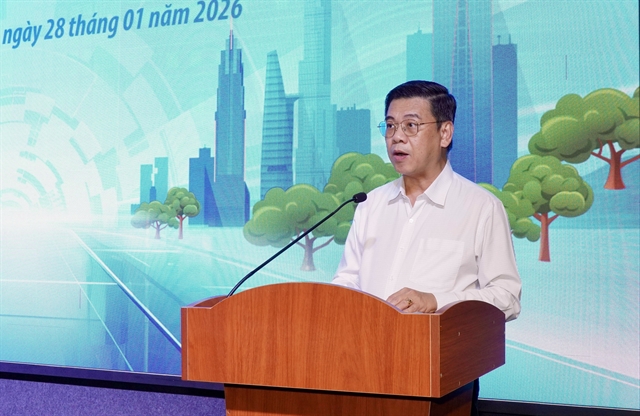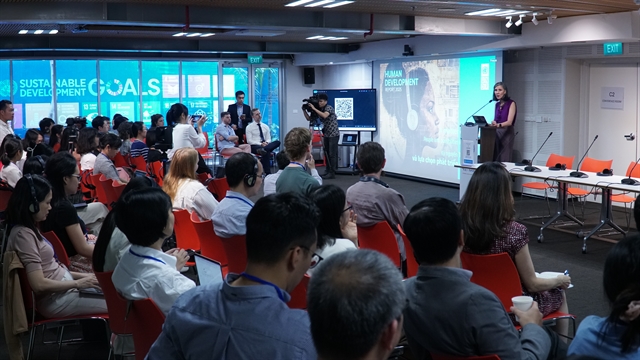 Society
Society

 |
| Students try their hand at controlling a ball-grabbing robot during a workshop on "Applying AI in Learning" at FPT Primary and Secondary School in Đà Nẵng City. — VNA/VNS Photo Văn Dũng |
HÀ NỘI — As the world enters the age of Artificial Intelligence (AI), Việt Nam continues to maintain a strong standing in human development, defying a global slowdown, according to the United Nations Development Programme (UNDP)'s 2025 Human Development Report launched on Monday in Hà Nội.
The Human Development Index (HDI) is a composite indicator that measures a country's progress in health, education, and material well-being.
According to the report, Việt Nam remains in the High Human Development category, with an HDI score of 0.766 in 2023, ranking 93rd out of 193 countries and territories.
Since 1990, Việt Nam's HDI has surged by 53.5 per cent, one of the most impressive increases in East Asia and the Pacific.
“This is a remarkable achievement that reflects Việt Nam’s sustained investment in health, education, and income growth,” said Ramla Khalidi, UNDP Resident Representative in Việt Nam.
“It demonstrates the country's long-term commitment to inclusive development.”
However, the report warns that development progress is not evenly distributed. When adjusted for inequality, Việt Nam’s HDI drops to 0.641, reflecting a 16.3 per cent loss due to unequal access to healthcare, education and income.
Within the country, disparities are evident. Hà Nội and Hồ Chí Minh City posted the highest HDI scores at 0.799 and 0.795, respectively. In contrast, mountainous provinces such as Lai Châu and Hà Giang recorded HDI scores below 0.6.
At the global level, the report delivers a sobering message. The projected increase in global HDI for 2024 is the lowest since 1990, excluding the crisis years of 2020–2021, threatening progress toward achieving very high human development by 2030.
“This deceleration signals a very real threat to global progress,” warned Achim Steiner, UNDP Administrator.
“If 2024’s sluggish growth becomes the new normal, the world will become more divided, more fragile, and less resilient.”
For the fourth consecutive year, the gap between high and low HDI countries has widened, driven by rising debt burdens, trade tensions, and a form of industrialisation that fails to generate enough decent jobs.
AI for human development
Amid these challenges, the report identifies AI as both a transformative opportunity and a potential risk, especially in countries like Việt Nam, where digital transformation is advancing rapidly.
 |
| The launch event of the United Nations Development Programme (UNDP)’s 2025 Human Development Report, held on Monday in Hà Nội. — Photo courtesy of the UNDP |
“The country’s digital transformation is accelerating. Its development vision is bold. And AI is now at the heart of national debates on Việt Nam’s future,” Khalidi added.
She pointed to key policy commitments, including Decision 127, Resolution 57, and Prime Minister Phạm Minh Chính’s pledge to train 100,000 AI engineers, as indicators of the country’s forward-looking approach.
“This is a bold move and the Prime Minister’s message that AI must be safe, ethical, and inclusive sets the right tone for the region,” she said.
Still, the report warns of an emerging global “AI equity gap,” especially in developing countries, that could exacerbate existing inequalities if left unaddressed.
“Việt Nam must act now to avoid falling into that gap,” Khalidi emphasised.
A global survey released alongside the report reflects growing optimism about AI. While 50 per cent of respondents worry their current jobs could be automated, 60 per cent believe AI will create new job opportunities. Only 13 per cent fear job losses.
Among respondents in low- and middle-HDI countries (groups with which Việt Nam shares many socio-economic characteristics ), 70 per cent expect AI to increase their productivity, and two-thirds anticipate using AI in education, healthcare or work within the next year.
Vũ Thị Thanh from the Institute for Human, Family and Gender Studies, noted that women, the elderly, ethnic people and those with disabilities are among the most vulnerable to being left behind in a digital society. Closing the digital divide and promoting digital inclusion are urgent priorities to ensure that science, technology and AI contribute meaningfully to human development.
As AI reshapes economies and institutions, the report calls for the Government to centre people in all innovation strategies. It outlines three urgent policy priorities, including building economies where people work with AI, not against it; ensuring human agency throughout the AI lifecycle, from design to deployment; and modernising education and healthcare systems to meet the demands of the 21st century.
For Việt Nam, the positive signals from its HDI performance and the public’s openness to AI highlight an urgent need to build inclusive digital infrastructure that ensures equitable access to electricity, the Internet, digital devices, and AI-related skills for all citizens.
Without such measures, the digital divide could quickly evolve into a broader human development gap, especially in rural, mountainous, and ethnic minority areas. — VNS




